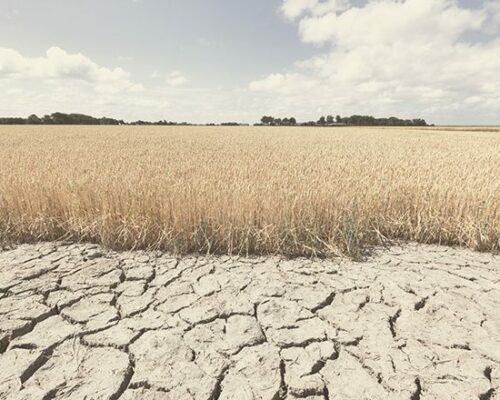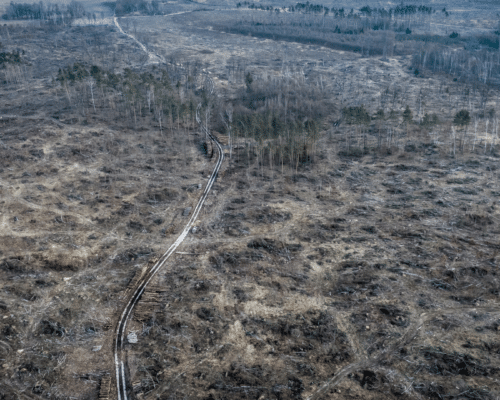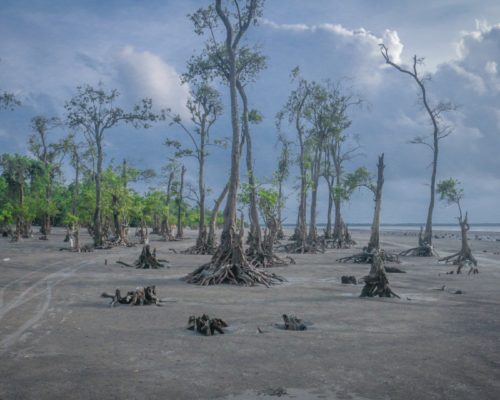Op-Ed: Gulf Coast Communities Speak Out Against Japanese-backed LNG Development
Photo: Susanne Wong
06 December 2023 – by Susanne Wong Comments (0)
As we drove by the long chain of refineries and other petrochemical facilities surrounding the small town of Port Arthur, Texas, noxious fumes wafted into our truck. The residents of Port Arthur, Groves and towns along the Gulf Coast are forced to inhale polluted air day in and day out.
“Smell that? To some people, it smells like money, but it’s death to us,” said John Beard III of the Port Arthur Community Action Network. “That’s the smell of death.”
Colleagues from Friends of the Earth Japan and I travelled to Texas and Louisiana in early November for a week-long tour, organized graciously by the Texas Campaign for the Environment, to witness and learn about the impacts of LNG development on local communities. We also discussed opportunities for our Fossil Free Japan coalition to collaborate to pressure the Japanese government and corporations to stop financing fossil fuel development in the Gulf South.
People Fish from These Waterways
Beard’s family has long fought against LNG and petrochemical development. Their community has been battered directly both by fossil fuel development and by the intense hurricanes and drought worsened by the climate crisis. The fracking boom in the Permian basin and lifting of the crude oil export ban in 2015 spurred massive LNG and petrochemical development along the Gulf Coast.
Communities in Port Arthur, largely communities of colour, once thrived off the rich fisheries from the lakes and waterways. However, the proliferation of LNG projects and petrochemical facilities and regulatory failure to enforce environmental standards have allowed the fossil fuel industry to pollute the air and water without consequence. When significant water runoff occurs during storms, petrochemical facilities dump untreated wastewater into local waterways. “And people fish from these waterways,” said Beard.
Communities bear the brunt of the suffering, particularly regarding their health. Residents of Port Arthur and other communities on the Gulf Coast suffer from high rates of cancer, respiratory infections and migraines. Beard personally underwent kidney dialysis as a teenager and had a kidney transplant at the age of 22.
Water security is also an issue. Industrial water use is prioritised over the needs of local residents. Pipelines and other water-related infrastructure were developed by local governments for LNG facilities, which use huge amounts of water and are charged at the same rates as residential customers. These facilities are “just big water hogs,” said Jeffrey Jacoby of the Texas Campaign for the Environment.
Five LNG terminals are operating along the Gulf Coast, with many more planned or under construction. The Port Arthur and Golden Pass terminals are currently under construction, and the nearby Sabine Pass LNG terminal, the largest in the US, has been operating since 2016.
The Japanese government is the largest global financier of LNG export terminals, providing 50% of international public finance, or $39.7 billion, for LNG export capacity built from 2012-2022 and projects under construction or expected to be built by 2026. In the Gulf South, Japan’s export credit agencies, the Japan Bank for International Cooperation and Nippon Export and Investment Insurance provided $3.7 billion in financing for the Freeport LNG terminal and $4.5 billion for Cameron LNG in 2014. The Japanese and Korean governments plan to develop new global ammonia and hydrogen production and export facilities, including Lake Charles and Corpus Christi. These projects would worsen the climate crisis and subject communities to further exploitation and harm.
Explosion at Freeport
Before dawn on June 8 last year, an explosion at the Freeport LNG export terminal sent a fireball 450 feet in the sky and released roughly 120,000 cubic feet of LNG, methane. The force from the blast thrusted a lifeguard off their perch and prompted a toddler wandering on the nearby beach to fall face-first onto a rocky outcropping, shared Melanie Oldham and Jenny Loehr from the frontline group Better Brazoria.
The explosion happened after a safety valve on a pipeline was inadvertently left closed, causing the pipe to over-pressurise and burst. The $14 billion plant was completely shut down for 8 months. Investigations by the US Federal Energy Regulatory Commission found that the owner, Freeport LNG, violated a condition of the project’s approval. Instead of having over 200 employees working on site, FERC found that Freeport LNG was 94 employees short. They also uncovered that workers suffered from “operator fatigue” from working 12-hour-long shifts and other hazardous conditions.
This is a prime example of corporations prioritizing profits over environmental protection and the well-being of people. “We face all of the dangers and risks from this project every single day and receive very few benefits,” said Oldham. “The company makes billions of dollars and couldn’t invest enough to make the plant safe.”
In 2021, Freeport LNG, led by billionaire CEO Michael Smith, made $5 million per day in tolling revenues. The company received federal approval a few weeks ago to restart full operations over 16 months after the accident.
The neglect and cutting corners of the operation of the Freeport LNG facility reflect its lack of care and respect for communities neighbouring the facility. After the Freeport explosion, the company failed to show up to a public hearing to share what had happened.
The town of Freeport was once a thriving community that relied on the shrimp industry, which was historically one of the region’s top industries. However, fisheries have declined as LNG, refineries, and other petrochemical facilities were developed, which has degraded the environment. Freeport resident Jenny shared that her grandson recently caught a fish so damaged by pollution that its scales were falling off.
The Port of Freeport has also spent the last 20 years purchasing properties and forcing out residents of Freeport’s historic East End, a historically black community developed during segregation. Most have been bought or forced out. Now, the land they were relegated to and have built their lives around has been bought up for further expansion of the port area.
Japan’s Push for Gulf Coast Fossil Expansion
Despite the serious health and safety concerns with the Freeport LNG terminal, Japan’s export credit insurance agency, NEXI, plans to support the expansion of the Cameron LNG terminal located on Calcasieu Lake in Louisiana. JERA, the world’s largest corporate importer of LNG, has 20-year offtake agreements with Freeport, purchases LNG from Cameron and Calcasieu Pass export terminals, and signed an agreement this year to offtake 1 mtpa for 20 years from the proposed Calcasieu Pass 2 LNG export terminal, which is facing strong resistance.
Japanese companies with stakes in Freeport LNG (JERA – 25.7% and Osaka Gas -10.8%) suffered massive losses during the shutdown when they were forced to purchase LNG on the spot market.
“JERA has to seriously consider whether they want to be part of a dirty, risky project,” said Oldham.
Recently, the Japanese government announced plans with South Korea to develop a joint ammonia/hydrogen supply network supported by public finance. Co-firing of ammonia at coal power plants and hydrogen at gas plants would prolong the use of fossil fuels and delay the transition to renewable energy in Asia. Yet, Japan’s Mitsubishi Corporation signed agreements to develop ammonia production facilities along the Gulf in Corpus Christi and Lake Charles this year.
Centering Profits Over People
Travis Dardar stared out the window of his shrimping boat, reminiscing about his life in Calcasieu Parish before the Calcasieu Pass LNG terminal was built. Dardar started shrimping when he was six. As we travelled along the waterways towards the Gulf of Mexico, brown pelicans and dolphins travelled by our side.
Local fishermen used to catch 700,000 pounds of shrimp per year before the Calcasieu Pass LNG export terminal started operating last year, said James Hiatt, founder of For a Better Bayou. So far this year, local fishermen have faced a 90% decline in shrimp catch. Fishermen have also suffered losses in crab catch, but no compensation has been provided. The area has been facing a serious drought and an increase in ship traffic with LNG tankers. A Japanese LNG tanker passed by as if on queue during our trip, dwarfing our shrimp boat as it travelled to fill up at the Cameron LNG export terminal.
Dardar used to live 300 feet from the proposed Calcasieu Pass 2 terminal. Once construction started, vibrations in his house would knock the pictures off his walls. His kids suffered from illness, and his wife had a heart attack. “By the time they build their plants, it will be all plants and no fish. If these LNG projects are so good, why are all the fishermen on their knees and the executives’ pockets are lined with cash?”
According to research by the Louisiana Bucket Brigade, Venture Global’s Calcasieu Pass LNG export terminal violated its air pollution permits on 286 of the first 343 days it was in operation, 83% of its first year. Instead of cleaning up its operations, Venture Global petitioned the state air quality agency to increase its allowable pollution limits. The company also received $184 million in tax exemptions for one year. Meanwhile, local communities up and down the coast suffer from a lack of funding, leaving business districts struggling and schools with insufficient resources. Venture Global has plans to build the Plaquemines, Delta and Calcasieu Pass 2 LNG terminals.
“I’m disgusted they want to build two more LNG terminals here and more upstream when they can’t even follow the rules here,” said Dardar. “They don’t follow the rules or even try to, and there are no consequences if they don’t. They take so much and give so little back.”
Hiatt reflected on the gorgeous wetlands surrounding us in Calcasieu parish with its cheniers and water features. “The wetlands are like a grocery store – they’ve been providing and blessing our families for generations. And they want to pave it over for fossil fuel exports to continue exploiting the land.”
“We say we love our neighbour, but we pollute nonstop and act like we can extract and exploit without end, and we can’t. We all have one life. What are we doing if we only centre profits and not people?” said Hiatt. “I just think about my children and their children and about the suffering we’re inflicting on them because we couldn’t break free from our addiction to fossil fuels.”
No More “Sacrifice Zones”
Over and over, frontline organisers said these areas are considered sacrifice zones. Our new report, Biden’s Fossil Fuel Fail, shows that US oil and gas production will continue to grow under the Inflation Reduction Act, particularly due to escape hatches for LNG exports and petrochemicals that disproportionately impact communities in the Gulf South. Dardar’s response to Japanese importers, “Don’t buy LNG. It’s not worth it. It’s like selling your soul to the devil. You don’t sacrifice someone’s life for someone else.”
The fossil fuel industry’s egregious human rights violations of already marginalised communities in the Gulf Coast were shocking, particularly for our Japanese colleagues who assumed this wouldn’t happen in the US. They drew parallels with the environmental and social destruction caused by Japanese-financed fossil fuel projects in Indonesia and the Philippines.
“What’s happening in the Gulf South is happening in the Global South,” said Roishetta Ozane, founder of The Vessel Project and Finance Coordinator with Texas Campaign for the Environment, during a Power-Up rally in New Orleans at the close of my trip. “Corporations are extracting our resources and claiming it’s benefiting the American people. But it’s all about money and greed.”
As I reflect on our trip, what stands out is the blatant exploitation and harm inflicted on low-income, predominantly communities of colour by the fossil fuel industry.
I’m also in awe of the grace, tenacity, and love of frontline community activists, who power their work to protect their communities and future generations. I am excited to partner with them and our Fossil Free Japan coalition to stop Japanese investment in these destructive projects.
“I live in St. John Baptist Parish with one of the highest rates of cancer,” said Jo Banner of the Descendants Project, an emerging organization committed to the intergenerational healing and flourishing of the Black descendant community in the Louisiana river parishes. “I am calling on financiers in Japan to stop financing devastation for our past, present and future. We don’t want to die. We need you to stop.”
Susanne Wong is the Asia Programme Manager at Oil Change International, a US-based research and advocacy organisation that works to expose the true costs of fossil fuels and to speed the ongoing transition to clean energy. She helps facilitate the Fossil Free Japan coalition which is working to end Japan’s support for overseas fossil fuel projects.
Oil Change International is a research, communications, and advocacy organization focused on exposing the true costs of fossil fuels and facilitating the ongoing transition to clean energy.
Disclaimer: The views and opinions expressed in this article are those of the author and do not necessarily reflect the official policy or position of Energy Tracker Asia.
This article was first published on Oil Change International and republished with permission.



